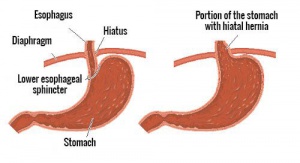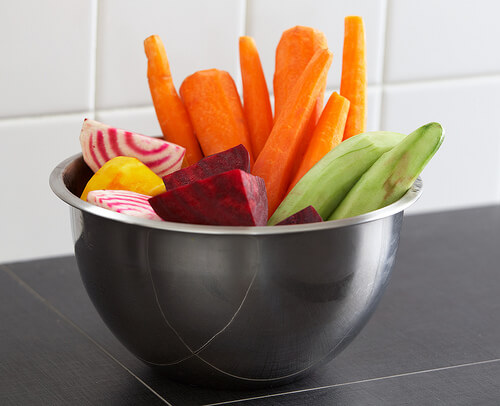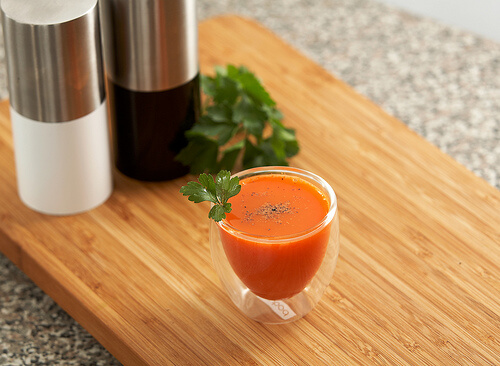Natural Remedies for the Symptoms of a Hiatal Hernia

A hiatal hernia happens when a portion of the stomach pushes toward the chest or diaphragm area. When this happens, it can also cause gastroesophageal reflux. Even just changing your habits can bring significant improvement. It’s important to treat the symptoms of a hiatal hernia so that it doesn’t cause more serious problems.
So, here are some natural remedies to do just that. Interested? Read on and learn what they are!
Hiatal hernia and heartburn
A hiatal hernia can come along with an excess of stomach acid. You can combat this by avoiding acidic foods (like salt, sugars, fried foods, and dairy products) and regularly eating alkaline foods rich in flavonoids:
- Figs
- Red Fruits
- Grapes
- Beets
- Carrots
- Cucumber
- Lettuce
- Fresh spinach
- Celery
- Turnips
You might like:
Use stevia or agave nectar, they’re great natural substitutes for sugar.
You should avoid using antacids. They give you momentary relief but can do extensive damage to your digestive system.
They also have high levels of sodium, aluminum, calcium, and magnesium, and that could change your pH balance. A better choice would be medicinal clay taken internally. Or, you might prefer a mix of dietary salts (magnesium citrate, for example)
An acidified body is a breeding ground for all kinds of pathogens, so hiatal hernia and acid reflux are really warning signs that should put you on alert.
Warm bicarbonate spa water: a simple treatment for the symptoms of a hiatal hernia
One pleasant way of getting rid of acid in the body is drinking bicarbonate spa water and taking warm bicarbonate spa baths. Each spa has a type of water with specific characteristics, so we should find out which ones are bicarbonate. Seawater is also alkalizing.
Regenerating digestive mucus
People with a hiatal hernia can have problems with irritated digestive mucus because of the constant acid reflux. In that case, you can take daily organic liquid silica, which will also improve your skin, hair, and nail health.
Also, these foods and supplements will bring the mucus back to normal:
- Vitamin C
- Carrot juice
- Aloe vera
- Flax seeds soaked in water
- Plantains
- Marshmallow
Digestion starts in the mouth
A healthy diet is vital to proper nutrient absorption. This is why it’s essential to chew your food thoroughly.
You should only swallow once the food is totally broken up and mixed with saliva, which contains digestive enzymes. Doing this keeps you from overworking your stomach. People with a hiatal hernia often chew too little. So, acid reflux is like the stomach’s way of refusing the food.
Read more:
7 Tips for Helping Your Body Absorb More Calcium and Prevent Calcium Deficiency
As Gandhi said, “Chew your drink and drink your food.” His point was that we should even “chew” liquids.
To do this, you have to try to eat consciously and avoid too much stimulation (conversations, television, etc.).
An old remedy
This old, natural remedy for the symptoms of a hiatal hernia involves drinking a juice preparation for nine days. You make it with these ingredients: 1/4 of a large, raw, throughly washed and peeled potato (roughly ¼ to 1/3 cup), along with two tablespoons of extra virgin olive oil.
This alkalizing, anti-inflammatory preparation is very effective and can help improve your health in only nine days.
You can either make potato juice or buy it from a naturalist or herbal store.
Three-vegetable diet
Another food-based natural remedy for the symptoms of a hiatal hernia involves just three vegetables. Basically, you eat potato, cabbage, and carrot for three days. You can also eat apples and have them any which way: raw, boiled, baked, or liquefied.
Other Advice
Here are a few more tips on how to relieve the discomfort caused by a hiatal hernia:
- Avoid tobacco, which already contributes to esophageal irritation.
- Avoid medications like aspirin that change the body’s pH level.
- Medication with hormones like estrogen or progesterone can weaken the diaphragm muscles and produce acid.
- It’s better not to strain the stomach, so eat smaller meals more often.
- Avoid very cold or very hot foods and drinks.
- It’s not a good idea to drink water during a meal. It’s better to have it an hour before or after digestion.
- At meals, eat raw and natural foods first, then cooked foods.
- Sleep with the upper part of your body slightly elevated.
All cited sources were thoroughly reviewed by our team to ensure their quality, reliability, currency, and validity. The bibliography of this article was considered reliable and of academic or scientific accuracy.
- Biblioteca Nacional de Medicina. Bicarbonato de sodio. Abril 2017. U.S. Department of Health and Human Services.
- Calvi Lenzi de Almeida K, Spreafico Fernandes F, et al. Efecto de las semillas de linaza (Linum usitatissimum) en el crecimiento de ratas wistar. Revista Chilena de Nutrición. Diciembre 2008. 35 (4).
- Canadian Society of Intestinal Research. Baking soda for heartburn. 2012.
- Clinica Mayo. Hernia de hiato.
- Harvard Health Publishing. Herbal remedies for heartburn. Febrero 2021.
- Kenny O. M, Mc CArthy C.M, et al. Anti-inflammatory properties of potato glycoalkaloids in stimulated Jurkat ans Raw 264.7 mouse macrophages. Life Science. Abril 2013. 92 (13): 775-82.
- Moreira V. F, López San Román A. Enfermedad por reflujo gastroesofágico. Revista Española de Enfermedades Digestivas. Mayo 2004. 96 (5).
- Moreira V. F, López San Román A. Úlcera péptica. Revista Española de Enfermedades Digestivas. Enero 2004. 96 (1).
- Panahi Y, Khedmat H, et al. Efficacy and safety of aloe vera syrup for the treatment of gastric-esophageal reflux disease: a pilot randomized positive-controlled trial. Journal of Traditional Chinese Medicine. Diciembre 2015. 35 (6): 632-636.
- Pinto Dávalos J, Bustamante García Z. Evaluación de la actividad gastroprotectora de los extractos de llantén. Biofarbo. Diciembre 2008.
- San Mauro Martín I, Garicano Vilar E. Papel de la vitamina C y los beta-glucanos sobre el sistema inmunitario: revisión. Revista Española de Nutrición Humana y Dietética. Diciembre 2015. 19 (4).
- Surgical Consultants of Northern Virginia. Exercises to prevent a hiatal hernia.
This text is provided for informational purposes only and does not replace consultation with a professional. If in doubt, consult your specialist.










